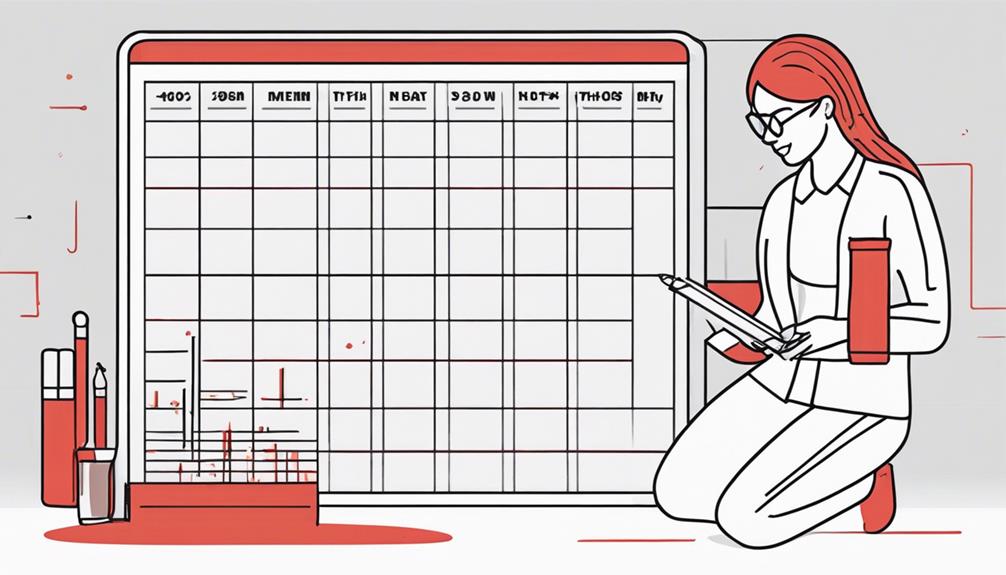Imagine your health as a garden that requires regular tending to flourish. When it comes to diabetes, screening serves as the essential tool to ensure your garden remains vibrant.
But what specific tests should you prioritize, and how often should you schedule them? Let's explore the key practices that not only monitor your diabetes risk but also empower you to make informed decisions about your health.
Key Takeaways
- Regular monitoring aids in early detection and management of diabetes.
- Understanding test results helps in personalized intervention planning.
- Lifestyle changes like exercise and healthy diet are crucial for diabetes control.
- Consistent tracking of blood glucose and A1C levels is essential for effective management.
Importance of Regular Screening

Regular screening for diabetes is crucial in detecting the condition early and managing it effectively. Early detection allows for timely intervention, which can significantly impact the course of the disease. By identifying diabetes in its initial stages, individuals have a better chance of implementing preventive measures to slow down its progression or even prevent it altogether. This proactive approach is especially important considering the rising prevalence of diabetes globally.
Understanding the risk factors associated with diabetes is essential for effective management. Factors such as family history, obesity, physical inactivity, and poor diet significantly increase the likelihood of developing diabetes. Regular screenings help individuals assess their risk levels and take appropriate actions to mitigate these factors. By addressing these risk factors early on, individuals can better manage their condition and improve their overall health outcomes.
Types of Diabetes Tests
Early identification of diabetes through various types of tests is crucial for effective management and intervention. Two common tests used for diagnosing and monitoring diabetes are blood glucose tests and A1C levels.
Blood glucose tests measure the amount of sugar (glucose) in your blood. This test can be done after fasting (fasting plasma glucose test) or at any time of the day (random plasma glucose test). Another type is the oral glucose tolerance test, where your blood sugar is tested before and after drinking a sugary solution. Elevated blood glucose levels may indicate diabetes.
A1C levels reflect your average blood sugar levels over the past two to three months. This test doesn't require fasting and is a good indicator of how well your diabetes is being controlled. A higher A1C level indicates poorer blood sugar control and may suggest the need for adjustments in your treatment plan.
Regular monitoring of blood glucose and A1C levels is essential for managing diabetes effectively and preventing complications. Consulting with healthcare providers to interpret these test results and make informed decisions is key to maintaining good health with diabetes.
Frequency of Monitoring

For optimal management of diabetes, monitoring the frequency of blood glucose and A1C levels is essential. Following monitoring guidelines is crucial to keep your condition in check. The frequency of monitoring can vary based on individual needs and the type of diabetes. Typically, it's recommended to check your blood glucose levels multiple times a day, especially if you're on insulin therapy. A1C levels, which provide an average of your blood sugar levels over the past 2-3 months, should be monitored at least every 3-6 months.
Consistent tracking of your blood glucose and A1C levels can help you and your healthcare provider make informed decisions about your treatment plan. Establishing regular intervals for monitoring ensures that any fluctuations in your blood sugar levels are detected early, allowing for timely adjustments in your medication or lifestyle. By staying diligent with your monitoring routine, you can better manage your diabetes and prevent potential complications. Remember, monitoring is key to maintaining good control of your diabetes.
Understanding Test Results
Understanding your blood glucose and A1C test results is crucial for effectively managing your diabetes. When interpreting numbers from these tests, it's essential to look beyond the values and identify trends over time. Here are some key points to consider:
- Consistency: Pay attention to how consistent your blood glucose levels are throughout the day. Fluctuations can indicate the need for adjustments in medication or lifestyle habits.
- Target ranges: Understand the target ranges for blood glucose and A1C levels set by your healthcare provider. Deviations from these ranges may require intervention.
- Long-term control: The A1C test provides an average of your blood glucose levels over the past 2-3 months. Monitoring this value helps assess your long-term diabetes control.
- Pattern recognition: Look for patterns in your test results, such as consistently high readings after certain meals or at specific times of the day. Identifying these patterns can guide personalized interventions to improve your diabetes management.
Implementing Lifestyle Changes

To effectively implement lifestyle changes for managing diabetes, focus on incorporating exercise and healthy eating habits into your daily routine. Healthy habits play a crucial role in controlling blood sugar levels and reducing the risk of diabetes-related complications.
Aim for at least 150 minutes of moderate-intensity aerobic activity per week, such as brisk walking, cycling, or swimming. Additionally, include strength training exercises at least two days a week to improve muscle strength and overall health.
Dietary modifications are equally important. Choose a well-balanced diet rich in fruits, vegetables, whole grains, lean proteins, and healthy fats. Limit the intake of sugary beverages, processed foods, and foods high in saturated and trans fats. Monitor your carbohydrate intake and opt for complex carbohydrates that are high in fiber to help regulate blood sugar levels.
Frequently Asked Questions
Are There Any Specific Risk Factors or Symptoms That May Indicate a Need for More Frequent Diabetes Screening?
If you experience persistent thirst, frequent urination, unexplained weight loss, or have a family history of diabetes, these may indicate a need for more frequent screening. Early detection through regular screening can help prevent complications.
Can Regular Diabetes Screening Help to Prevent the Development of Complications Associated With Diabetes?
Regular diabetes screening can be a game-changer in preventing complications. By catching issues early, you can take preventative measures to maintain health. Embrace screenings for the long-term health benefits they offer.
How Does Age Play a Role in Determining the Frequency of Diabetes Screening?
When determining the frequency of diabetes screening, age plays a crucial role. Younger individuals may have less frequent screenings, while older adults might need more regular tests. Age factors into screening intervals to ensure effective monitoring.
Are There Any Alternative Methods of Diabetes Screening That May Be More Suitable for Certain Individuals?
In the realm of diabetes screenings, exploring alternative methods tailored to individual needs is crucial. A personalized approach can uncover more suitable options, ensuring that each individual receives the most effective and tailored screening for their unique health profile.
What Resources Are Available for Individuals Who May Need Financial Assistance to Cover the Costs of Diabetes Screening Tests?
If you need financial assistance for diabetes screening, explore options like community health centers, local hospitals, and nonprofit organizations. They often offer free or discounted screenings. Different screening methods are available, so discuss suitable options with healthcare providers.
Conclusion
You now have the knowledge and tools to take control of your diabetes screening routine. By staying proactive and consistent with your monitoring, you can catch any changes early and make necessary adjustments to your lifestyle.
Remember, regular screening is key to managing your diabetes effectively and maintaining your overall health. Keep up the good work and continue prioritizing your well-being.
Your dedication will pay off in the long run.